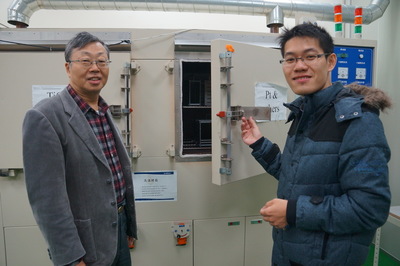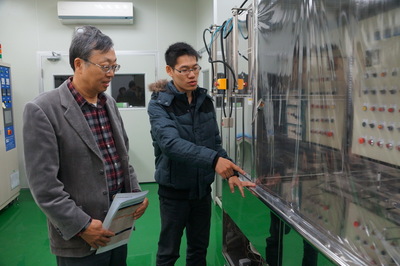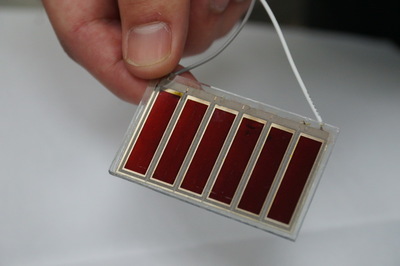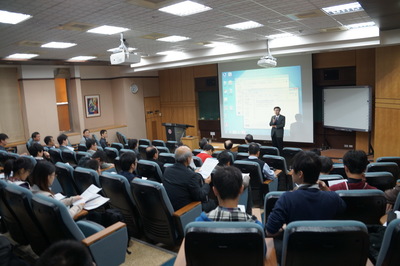NCKU to organize academia-industry alliance on dye-sensitized solar cell production




Tainan, Taiwan, December 2, 2013
Hundreds of research teams studying on Dye-Sensitized Solar Cell (DSSC) and their counterparts from the industry in Taiwan gathered recently at the DSSC Academia-Industry Forum hosted by the National Cheng Kung University (NCKU) Research Center for Energy Technology and Strategy (CETS) to explore topics related to the development of DSSC.
In addition to the forum, the NCKU Dye-Sensitized Solar Cell (DSSC) Core Laboratory was open to the public for the first time on November 29 introduced by Dr. Yu-Min Yang, a professor from the Department of Mechanical Engineering.
“DSSCs is the third generation solar cells, succeeding silicon-based and thin-film solar cells,” explained Dr. Yang who also called for the establishment of an academia-industry alliance on DSSC.
According to him, the unique characteristics of DSSCs are its ability to generate electricity even with weak light sources, its transparency as well as its colorful dyes.
Dr. Yang also stressed, the manufacturing process of DSSC is simple, does not require costly equipment and facilities and uses materials at cheap prices.
In other words, DSSCs can be manufactured at low cost, and hence increasing the market competitiveness of DSSCs, according to him.
At present, the photoelectric conversion efficiency of DSSCs is 12.3% which is still considered low. However, DSSCs have translucent properties, and hence are suitable to be used as construction materials for building windows at glass curtain buildings.
DSSCs can also function as shading and insulator with electricity generation feature to achieve the benefit of energy efficiency in buildings, according to Dr. Yang.
DSSCs are more commonly used as batteries in portable electronic products such as calculators, watches, electronic dictionaries, mobile phones and other smaller-sized products.
Future applications of DSSCs could include attaching them on mobile phones, making them as foldable external devices, or even combining them with textile as portable electricity generator, hence in other words, demonstrating its huge market potential in the future.
Most importantly, DSSCs can be manufactured in large quantities using light and malleable electrode substrates based on whole printing process. Taiwan’s strengths in obtaining raw materials and having the necessary technology at all levels of manufacturing form a solid foundation for the DSSC industry.
NCKU Department of Electrical Engineering Professor Dr. Ching-Ting Li, who is also the former National Science Council (NSC) Department of Engineering and Applied Science director, added that the biggest problem in Taiwan’s academia is the gap between them and the industry.
This is where Dr. Yang comes in, as he has linked all levels of the industry as well as the academia to form an academia-industry alliance on the development of DSSC, hence making great contributions in this respect.
Manufacturers including Taiwan DSC PV, MKE Technology, Everlight Chemical and King Design Industrial Co. were invited to discuss about the establishment of academia-industry alliance besides from exhibiting their products in the forum.
During the event, Dr. Yang has led participants to visit the NCKU Dye-Sensitized Solar Cells (DSSC) Core Laboratory which is located at the first floor of the NCKU Department of Mechanical Engineering building.
Filled with NTD30 million worth DSSC equipment donated by Tripod Technology Corporation in 2011, the laboratory is furnished by Dr. Yang, his research team and other professors, and is capable of manufacturing DSSC from the start to the end using 30 configuration equipment and 12 detection devices alongside a clean room and a yellow room.
The forum has also invited industry participants of all levels to deliver speeches on various topics including research on DSSC chemicals, market trends and structure process of DSSC.
For the commercialization aspect of DSSC-related products, the forum has also invited the Industrial Technology Research Institute Center for Measurement Standards Deputy Division Director Teng-Chun Wu to give a talk on “Solar Cell Measurement Technologies and Standards.”
Hundreds of research teams studying on Dye-Sensitized Solar Cell (DSSC) and their counterparts from the industry in Taiwan gathered recently at the DSSC Academia-Industry Forum hosted by the National Cheng Kung University (NCKU) Research Center for Energy Technology and Strategy (CETS) to explore topics related to the development of DSSC.
In addition to the forum, the NCKU Dye-Sensitized Solar Cell (DSSC) Core Laboratory was open to the public for the first time on November 29 introduced by Dr. Yu-Min Yang, a professor from the Department of Mechanical Engineering.
“DSSCs is the third generation solar cells, succeeding silicon-based and thin-film solar cells,” explained Dr. Yang who also called for the establishment of an academia-industry alliance on DSSC.
According to him, the unique characteristics of DSSCs are its ability to generate electricity even with weak light sources, its transparency as well as its colorful dyes.
Dr. Yang also stressed, the manufacturing process of DSSC is simple, does not require costly equipment and facilities and uses materials at cheap prices.
In other words, DSSCs can be manufactured at low cost, and hence increasing the market competitiveness of DSSCs, according to him.
At present, the photoelectric conversion efficiency of DSSCs is 12.3% which is still considered low. However, DSSCs have translucent properties, and hence are suitable to be used as construction materials for building windows at glass curtain buildings.
DSSCs can also function as shading and insulator with electricity generation feature to achieve the benefit of energy efficiency in buildings, according to Dr. Yang.
DSSCs are more commonly used as batteries in portable electronic products such as calculators, watches, electronic dictionaries, mobile phones and other smaller-sized products.
Future applications of DSSCs could include attaching them on mobile phones, making them as foldable external devices, or even combining them with textile as portable electricity generator, hence in other words, demonstrating its huge market potential in the future.
Most importantly, DSSCs can be manufactured in large quantities using light and malleable electrode substrates based on whole printing process. Taiwan’s strengths in obtaining raw materials and having the necessary technology at all levels of manufacturing form a solid foundation for the DSSC industry.
NCKU Department of Electrical Engineering Professor Dr. Ching-Ting Li, who is also the former National Science Council (NSC) Department of Engineering and Applied Science director, added that the biggest problem in Taiwan’s academia is the gap between them and the industry.
This is where Dr. Yang comes in, as he has linked all levels of the industry as well as the academia to form an academia-industry alliance on the development of DSSC, hence making great contributions in this respect.
Manufacturers including Taiwan DSC PV, MKE Technology, Everlight Chemical and King Design Industrial Co. were invited to discuss about the establishment of academia-industry alliance besides from exhibiting their products in the forum.
During the event, Dr. Yang has led participants to visit the NCKU Dye-Sensitized Solar Cells (DSSC) Core Laboratory which is located at the first floor of the NCKU Department of Mechanical Engineering building.
Filled with NTD30 million worth DSSC equipment donated by Tripod Technology Corporation in 2011, the laboratory is furnished by Dr. Yang, his research team and other professors, and is capable of manufacturing DSSC from the start to the end using 30 configuration equipment and 12 detection devices alongside a clean room and a yellow room.
The forum has also invited industry participants of all levels to deliver speeches on various topics including research on DSSC chemicals, market trends and structure process of DSSC.
For the commercialization aspect of DSSC-related products, the forum has also invited the Industrial Technology Research Institute Center for Measurement Standards Deputy Division Director Teng-Chun Wu to give a talk on “Solar Cell Measurement Technologies and Standards.”
Provider:
新聞中心
Date:
2013-12-02